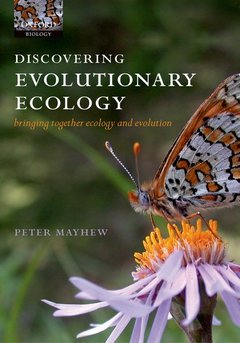Description
Discovering Evolutionary Ecology
Bringing together ecology and evolution
Author: Mayhew Peter J.
Language: English
Subject for Discovering Evolutionary Ecology:
Discovering evolutionary ecology : Bring ing ecology & evolution together
Publication date: 01-2006
232 p. · 17.2x24.8 cm · Hardback
Publication date: 01-2006
232 p. · 17.2x24.8 cm · Hardback
Discovering evolutionary ecology
Publication date: 01-2006
228 p. · 16.8x24 cm · Paperback
Publication date: 01-2006
228 p. · 16.8x24 cm · Paperback
Description
/li>Contents
/li>Biography
/li>Comment
/li>
Why are some kinds of organism species-rich and others species-poor? How do new species arise and why do some go extinct? Why do organisms grow and behave the way they do? This book provides an introduction to evolutionary ecology, the science that brings ecology and evolution together to help understand biological diversity. In a concise, readable format, Peter Mayhew covers the entire breadth of the subject, from life histories and the evolution of sex, to speciation and macroecology. Many emerging fields are also introduced, such as metabolic ecology, the evolution of population dynamics, and the evolution of global ecology. Discovering Evolutionary Ecology highlights the connections between these different subject areas, and for the first time paints a picture of a truly integrated field. It illustrates the research tools utilized, and demonstrates how advances in one area can spur on developments elsewhere when scientists combine evolutionary and ecological knowledge. To maximize accessibility, the book assumes only a basic knowledge of biology, includes a comprehensive glossary, and contains almost no maths. Each chapter provides suggestions for further reading, and there is also an extensive reference list. Ideal as an introduction to evolutionary ecology for undergraduates, this book will also interest established researchers, providing a broad and up-to-date context for their work.
Introduction: Where two fields meet. Evolutionary cover stories: the major transitions in evolution. Brave new worlds: the major transitions in ecology. Traits, invariants, and theories of everything: life history evolution. Sons, daughters and distorters: sex allocation and sex determining mechanisms. Voyagers, residents, and sleepers: evolution of dormancy and dispersal. Doing adaptive things: behavioural ecology, applied to plants. Evolution and numbers: evolution and population dynamics. A world of specialists: evolution of niche width. The good, the bad, and the commensal: evolution of antagonism and mutualism. Evolving together: coevolution. Birth of species: ecology and speciation mechanisms. Death of species: evolution and ecology and extinction mechanisms. Big evolution: macroevolution. Big ecology: macroecology. Combining in diversity: synthesis. References. Glossary. Index.
Peter Mayhew read Zoology at Oxford, and did his Ph.D. at Imperial College, London, studying reproductive behaviour in insects. He spent two years as a researcher at Leiden in the Netherlands, before becoming a Lecturer in Ecology at the University of York. His research combines many aspects of ecology and evolution, and includes life histories, behaviour, macroevolution, macroecology and conservation biology. He is married to Emese and has two daughters, Alice and Lara.
It is very rare to find an author who can convey the excitement of ecological research in a text book, but Peter Mayhew succeeds....It is a book that should prove an inspiration to thoughtful students at both undergraduate and postgraduate level. Peter Moore, Bulletin of the British Ecological Society 2006, 37:2
© 2024 LAVOISIER S.A.S.




